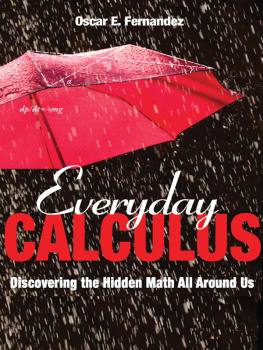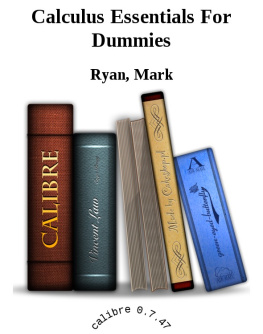Calculus In 5 Hours: Concepts Revealed so You Don't Have to Sit Through a Semester of Lectures
by Dennis Jarecke
All rights reserved. No portion of this book may be reproduced in any form without permission from the publisher, except as permitted by U.S. copyright law. For permissions contact:
Preface
Calculus is a vast and detailed subject that can take a lifetime to learn. So to teach Calculus in five hours I need to cut out a lot of material.
This book covers approximately 75% of the material taught in a college Calculus 1 course. Most of what's been cut out are function limits and trigonometric functions.
So why should you read this book?
Because you can learn the basics of Calculus quickly. Learning comes down to repetition. The more you're exposed to Calculus and the more familiar it becomes, the more likely you are to understand it.
By learning Calculus in five hours, you cram almost a semester's worth of material in your head quickly. When you cover it in your actual course, you'll be exposed to it a second time which allows you to learn it easier and faster at that point.
A second reason for reading this book is for a review. You may have learned Calculus years ago, but have forgotten it. Now you need or want to relearn it.
If this sounds like you, then this book will let you accomplish that. I don't assume you know Calculus. Instead, I take you from knowing nothing to having a broad overview of the main tools and concepts that are typically learned over the course of a college semester. And given your previous knowledge of Calculus, this will facilitate a quick relearning of the subject.
This book is organized into five parts and 32 chapters. The amount of time to go through each chapter is given in the table of contents and at the beginning of each part and chapter.
If this is your first time learning Calculus, go through the book sequentially to make sure you understand the concepts. If you're learning Calculus for the second time, feel free to skip around to get what you need.
And then when you're ready, head over to www.CalculusSolution.com for more lessons, Calculus specific calculators, and a library of fully worked out problems so you can get ahead with less effort.
For my wife and children,
Susan, Sara, Emily, Kiera, and Michael,
who put up with me sitting in the basement doing Calculus stuff.
I love you all very much.
To Dave Van Horn,
who understands the starts, stops, and frustrations of getting something done. Thanks for listening, answering questions, and being a big help to writers and entrepreneurs in the Cleveland area.
Special thanks to all those teachers and professors who had a hand in teaching me Calculus. I hope you know there are students who think what you do is really cool. I was one of them.
Thanks for making Calculus come alive.
Table of Contents
Your Biggest Obstacle to Learning Calculus
The obvious goal of this book is to teach you Calculus and to teach it to you quickly. However, there's one problem I can't overcome in this book.
Most people have been brainwashed into thinking they're bad at math. This brainwashing comes from experiences in school, upbringing, peer pressure, and a popular culture that often portrays smart people as anti-social and weird.
You may feel you can't learn something as complex as Calculus, but the scientific research doesn't support this.
You were born with an ability to learn, discover, and become an expert at mathematics. Learning a language is harder than learning Calculus. The only difference is that you don't remember how difficult it was to learn to speak, read, and write English. Yet, you accomplished it, didn't you?
The reason you were able to do something so complex at a young age is because you were born with a massively powerful supercomputer in your head. This supercomputer is deep inside your brain, and it specializes in detecting and amplifying patterns, performing mathematical operations, learning new concepts, and coming up with ideas from thin air.
But surrounding your supercomputer is a filter that limits what goes in and what comes out. That filter is your self-image.
If your self-image is programmed to believe you're not good at math, then you'll never demonstrate a proficiency in mathematics. However, if your self-image is changed so you know you're good at mathematics, then you'll be successful at learning it.
This isn't a bunch of cheerleading psycho-babble. A person who believes they're bad at math can be hypnotized and convinced they're good at it. In a state of hypnosis they can accurately work out math problems they've been exposed to, but consciously thought they couldn't solve.
Specifically, math avoidant college students have been exposed to hypnotic techniques and compared to control groups of similar college students. By using well-documented techniques of Ericksonian hypnotherapy, math instructors are able to systematically modify students' beliefs about their ability to do mathematics. Once their beliefs have been changed, those students make more A's, B's, and C's than those students in the control group.
In other words, a person's self-image can be changed to make them believe they're good at math. This allows their supercomputer to accept mathematical instructions, do the calculations, and give the correct answer.
To be clear, hypnosis by itself won't magically give you mathematical abilities. It can only modify your conscious and artificially negative belief that you're bad at math. Mathematical training (at whatever level you desire or need to be good at) plus a positive belief in your ability to do math is what creates success.
In the absence of hypnosis, you can associate positive emotions with learning Calculus. Think of a time you accomplished something you were proud of. Now take that same feeling and imagine getting the highest grade you've ever gotten in a math class.
This will start the process of changing your self-image. And when you do make a higher grade, your self-image will have been reprogrammed to believe you're good at math.
So, learning Calculus is not a matter of "if." It's a matter of "when."
In this book I promise to teach you Calculus as fast as I know how. Your job is to believe the scientific research and experience of people just like you who were able to learn Calculus.
You have a powerful computer in your head, and it will let you learn Calculus if you put positive, successful emotions into your learning process.
Let's begin...
Part 1 - Functions and an Overview of Calculus (27 minutes)
In part one there are four chapters. In it I'll introduce functions, what we can do with them, and then introduce the two main types of Calculus: Differential Calculus and Integral Calculus.
Chapter 1: Functions (10 minutes)
C alculus deals with functions, so knowing what they are is important. You've already seen them in High School, but it never hurts to go over them again.
A function is a way of assigning one set of numbers to another set of numbers.
For example, let's say you're at home and start walking through town. As you walk you keep track of how far you are from your house, and you measure the height of the buildings as you go. (Let's say you measure the height of the buildings on your right-hand side.) At every distance from your home, there is a height of a building. This is a function, and it may look something like this:

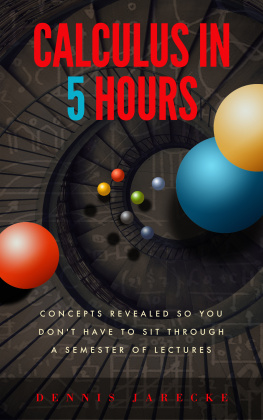
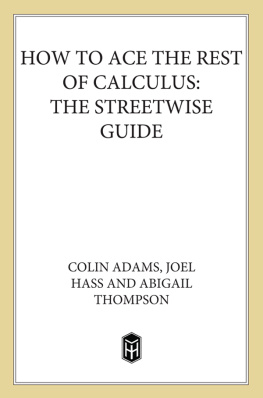
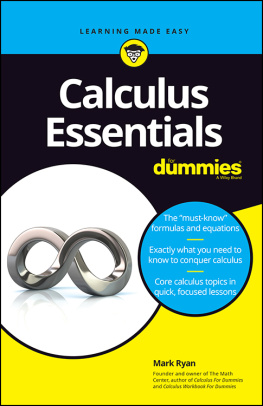

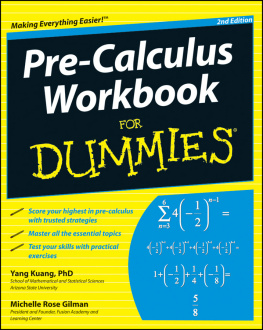

![Chris Monahan [Chris Monahan] - Calculus II](/uploads/posts/book/119088/thumbs/chris-monahan-chris-monahan-calculus-ii.jpg)
![W. Michael Kelley [W. Michael Kelley] - Calculus I](/uploads/posts/book/119087/thumbs/w-michael-kelley-w-michael-kelley-calculus-i.jpg)


